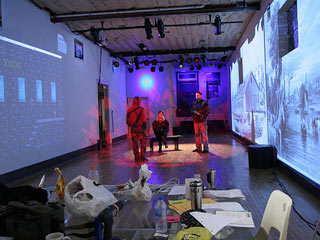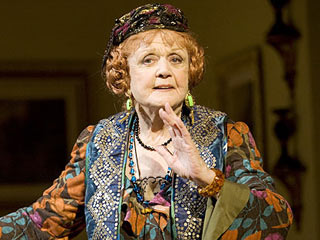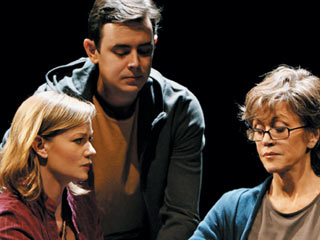WOYUBU, Blithe Spirit, 33 Variations, and Impressionism
by Anthony Chase
The Buffalo Quickies at Alleyway Theatre are unabashedly at the lowbrow end of the Buffalo theater spectrum. There is always a casual spirit of quasi-amateurism in the proceedings. The title “Quickies” refers to the brevity of each sketch. These aren’t “one-acts”; they’re “short works,” and the spirit is decidedly irreverent. Think Love American Style meets the senior talent show and you’ve got a pretty good idea of the unapologetic caliber.
As the punning name of the annual festival would imply, sexual innuendo has always been a part of this cheerful celebration of light sketch work. This year, in the spirit of the 18th anniversary, Alleyway presents the all grown up (or at least adolescent) “Sex Edition” of the Quickies. It’s not that big a stretch!
Through the Buffalo Quickies, Alleyway tries out new playwrights, and often gives experience to new talent, and so a touch of the spirit of community theater is to be forgiven.
Born to play comedy, Louise Reger may never play Queen Gertrude or Queen Hecuba. We’re more likely to see her as the Red Queen or the White Queen—and she is assuredly the Queen of the Buffalo Quickies. Last year she was a sensation as the Biblical “Fatted Calf,” all decked out in a cow party dress, giddy that she’d been invited to the celebration of the return of the prodigal son, until she begins to suspect that she’s the main dish. Reger makes a return this year and employs her gravelly voice and Buffalo accent to portray a variety of hard-taking cynical broads, including a heartless working woman who unsuccessfully urges a tormented young intellectual to jump from a roof, an unethical psychiatrist (or two), and (simultaneously) the world’s most manipulative mother.
With a voice uncannily similar to the one that June Foray provided for Rocky the Squirrel, Tammy Reger (daughter of Louise) returns as one of the amorous buffaloes from the festival’s logo, and also portrays an unwitting one-night stand, a wife deceived, and, in the festival’s most soulful moment, a woman who receives a phone call from a man in prison.
Carlton Franklin is especially good in a number of sketches, especially as men who are consistently misunderstood, a common theme of the evening. Sheila Connors gamely takes on multiple characters, as does Christopher S. Parada. Michael Seitz acquits himself handsomely in a variety of roles.
The beauty of the Quickies, in addition to its abundance of good-natured chuckles, is that if a sketch falls flat—and they occasionally do—it’s quickly over and followed by another. At its best, the spirit is akin to the old Carol Burnett television show, when minimally rehearsed performers used to break up at their own jokes. The trick to enjoying the Quickies is to leave your pretentions behind, and just allow yourself to join in the fun.

WOYUBU
If the Quickies are at the lowbrow end, WOYUBU was certainly devised for graduate students. The pretentiousness of combining Georg Büchner’s unfinished 1836 play, Woyzeck, with Alfred Jarry’s 1896 caprice, Ubu Roi, in a multi-media extravaganza that divides the audience into two theater spaces—one for “watching” and one for “playing”—is mitigated by the utter sincerity and full-throttle energy of the effort. Here, we enter the world of the avant-garde, wherein too much polish, clarity, or narrative drive diverts us from our mission.
The script was adapted by Josephine Anstey and Sarah Bay-Cheng, and the production was presented by the University at Buffalo’s Intermedia Performance Studio in collaboration with The Real Dream Cabaret, directed by Bay-Cheng at Downtown IPSpace on Main Street. While WOYUBU has completed its run, its unique qualities and the promise of future outings for the work warrant comment.
Woyzeck, known to theater and opera students everywhere as Büchner’s unwitting precursor to expressionism, is the story of a soldier who has an illegitimate child with his girlfriend Marie, and who descends into madness as the play progresses, a process indicated by a series of increasingly disturbing hallucinations. While this is going on, Woyzeck’s commanding officer humiliates him and pays him to submit to experiments at the hands of a doctor who feeds him only peas while collecting his urine (or saliva in the Alban Berg opera, Wozzeck, which was my first introduction to the story) for study. Marie eventually cheats on Woyzeck, and he eventually stabs her.
Ubu Roi is best known from illustrations and production photographs, ubiquitous in theater texts the world over. Ubu, the title character, careens through a series of episodes punctuated by various vulgar subversions of authority, all the while demonstrating how middle class values are devoid of morals.
The central plot of WOYUBU is the Woyzeck story. In this telling, the mental breakdown of the title character is presented using a kind of left-brain/right-brain dichotomy, whereby scenes of the Ubu Roi narrative become Woyzeck’s tormenting visions. To accomplish this, half of the audience is put in the Ubu Roi room, the other half in a room where Woyzeck is performed, and the stories are connected through the use of cameras and live video projection. Further connection is facilitated through the use of a ringmaster/narrator played with a comical German accent by Ron Ehmke.
The Woyzeck story line employed the talents of two of Buffalo’s most highly young regarded performers, Joe Wiens and Kate LoConti. The Ubu story was populated by an appropriately cacophonous crew of newcomers.
The concept of the show was inventive and engagingly presented. The use of video and of video animation was visually arresting and at times notably provocative. While the adaptation left us with numerous repetitions and some lengthy expanses that were nearly incomprehension, there was, nonetheless, something delightfully engaging about the whole. Moreover, it is thrilling, in the wake of Richard Foreman’s Buffalo residency and the growing success of such companies as Torn Space and Alt Theatre, to see our city become such a fertile playground for experimental work.

BLITHE SPIRIT
Meanwhile, in the utterly mainstream land of Broadway, a number of luminaries of the American theater can currently be seen.
Angela Lansbury, apparently not content to let her return to Broadway last year in Terrence McNally’s lackluster Deuce be her farewell to the stage, surprised everyone by coming back again. This time, the 83-year-old grand dame has engaged a surefire role in a beloved classic and returns as indefatigable Madame Arcati in Noël Coward’s Blithe Spirit. She is beyond wonderful in the part. Her every gesture, inflection, and facial expression is a memorable revelation.
Blithe Spirit is the story of a novelist, Charles Condomine, who invites a local psychic, Madame Arcati, to conduct a séance at the home he shares with his second wife, Ruth, hoping to pick up some ideas for a new book. The plan backfires however when Arcati accidentally summons the ghost of his first wife Elvira, resulting in a most unlikely ménage.
While Madame Arcati is actually a supporting role, in this production, Lansbury seems every inch the star. This, despite the fact that the real leading players are a team of heavy hitters themselves: Christine Ebersole as Elvira, Rupert Everett as Charles, and Jayne Atkinson as Ruth. Each is marvelous, including Ebersole who is the least ethereal ghost I have ever seen, but whose hilariously precise comic timing makes her casting worth the compromise. And while Everett is handsome and imbued with rare wry humor, and Atkinson is sublime as his inflexible and humorous living wife, this production will long be remembered for the incomparable genius of Miss Lansbury.

33 VARIATIONS
New York is rejoicing that Moises Kaufman’s play, 33 Variations, has brought Jane Fonda back to Broadway after an absence of 46 years. Playing an esteemed musicologist engaged in research on Beethoven’s Diabelli Variations, (which give the play its title), Fonda’s character is in a race between the advance of Lou Gehrig’s disease and the completion of her work. At the same time, her daughter is trying to repair her relationship with her remote mother while she still has the chance.
While Fonda’s performance is arguable superior to the material, which is manipulative, sentimental, and depends heavily on the emotional pull of Beethoven’s music, the overall impact is powerful and riveting. Best of all, the very qualities that made Fonda an iconic film star serve her marvelously on stage. Her sense of uncompromisingly resolve is colored with subtle shades of vulnerability, the flint that comes from 71 years of living sparks provocatively against flashes of the Jane Fonda we remember from films made in her youth. Her aggressive use of language makes even the most careless lines seem nuanced and important. As I watched her on stage I thought, “Is this what it was like to see the Great Katharine Cornell?” who could, they say, make both George Bernard Shaw and the most disposable of melodramas seem like an important theatrical event.
The supporting cast includes Susan Kellerman, giving an uncommonly witty and multilayered performance as Dr. Gertrude Ladenburger, archivist at Beethoven-Haus in Bonn. The production benefits, as well, from a remarkable set by Derek McLane, one of the most inventive designers working in the theater today. He envisions the Beethoven archive as a landscape of the mind, wherein the action can flow forward and backward in time.
IMPRESSIONISM
Like 33 Variations, part of the appeal of Michael Jacobs’ Impressionism is the return to Broadway of thrilling actors after a long absence. While 33 Variations boasts Jane Fonda, Impressionism features Joan Allen and Jeremy Irons—in addition to a supporting cast with such classy names as Marsha Mason and André De Shields.
The story is about a woman who owns a gallery, who is courted by a globetrotting photographer. In between we travel forward and backward in time and across continents, and there is heavy intellectual discussion of trivia.
Sadly, whereas 33 Variations offers numerous mental and emotional nooks and crannies to divert us from its faults, Impressionism is an often incomprehensible mishmash.
That is not to say that the impressive assembly of actors does not have the power to mesmerize—they do. But the gimmicky, if eye-popping production, directed by Jack O’Brien, is a lesson in chaos. Shortly before opening, huge expanses of text were cut from the script. Not enough.
For those who want to see some great actors, Allen, Irons, Mason, and De Shields each has wonderful moments. Just don’t expect sum whole to add up to the sum of its parts.
|
Issue Navigation> Issue Index > v8n14 (Week of Thursday, April 2, 2009) > WOYUBU, Blithe Spirit, 33 Variations, and Impressionism This Week's Issue • Artvoice Daily • Artvoice TV • Events Calendar • Classifieds |









 Current Issue
Current Issue